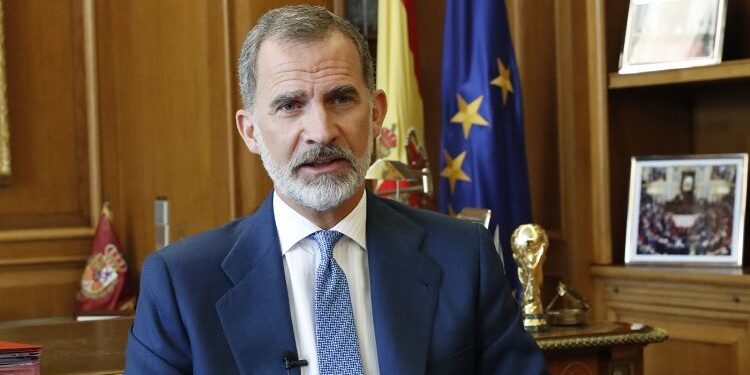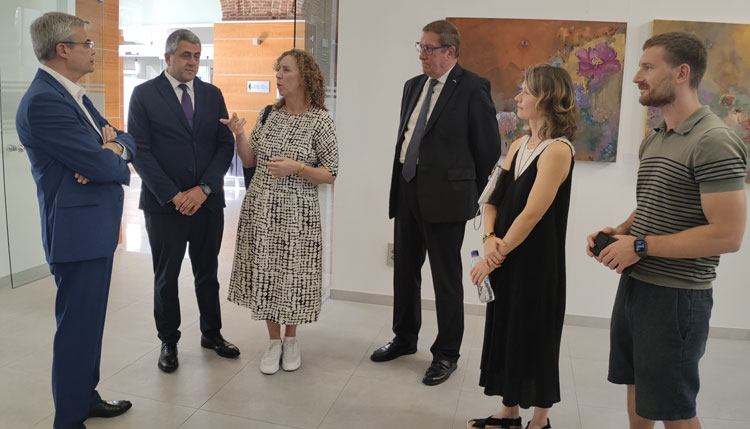The Diplomat
His Majesty the King was not informed in advance by the Saudis about the intentions of the company Saudi Telecom (STC) to acquire 9.9% of Telefónica, according to sources at the Zarzuela Palace yesterday.
The King’s Household responded to some reports or comments on talk shows that suggested that the Monarch or Zarzuela had prior knowledge of the operation. “The King’s Household has not received any communication from the STC company informing it of the Telefónica share purchase operation”, said the aforementioned sources.
Speculation about this alleged knowledge was based on the good relationship that the Spanish Royal Family and the Royal Family of Saudi Arabia have traditionally maintained, especially during the time when Don Juan Carlos was on the throne. Relations continue to be maintained and the Saudi Crown Prince, Mohammed bin Salman, who holds power due to the fragile state of health of his father, King Abdullah bin Abdelaziz, visited Spain in 2018 and met with Felipe VI.
The news of the purchase by STC, which is majority state-owned, of 9.9% of Telefónica was known on Tuesday afternoon by the government shortly before it took place. According to the ABC newspaper, STC had been acquiring small packages of shares throughout the year, until it reached 9.9%, which makes the Saudi group the main shareholder of the Spanish company.
The government said that it is studying the operation in detail, in accordance with the powers attributed to it by the Foreign Investment Law and the modifications introduced by the recent ‘anti-opposition’ shield.
Under the royal decree passed last July imposing the shield, the executive has to give permission to non-EU investors seeking to acquire more than 10% of a listed strategic company.
However, this threshold is lowered to 5% in the case of companies with interests in the field of national defence, a case in which government sources have acknowledged that Telefónica could be included.
Moncloa said yesterday that the acting Prime Minister, Pedro Sánchez, had not planned any meeting with the Saudi Arabian delegation attending this weekend’s G20 summit in New Delhi to ask for explanations of what happened. Yesterday, the acting foreign minister, José Manuel Albares, confirmed to journalists that, at this time, there were no plans to meet with Saudi Arabia”. Late in the afternoon, any possibility was completely ruled out, as Sánchez tested positive for Covid and was forced to cancel the trip he was due to make to India today.
Albares added: “We are analysing the information, but beyond all that, Spaniards can rest assured that the Spanish government will always look after the strategic interests of Spanish companies”.
Yesterday, the acting foreign minister, José Manuel Albares, confirmed to journalists that, at the moment, “there is no meeting planned with Saudi Arabia”. “We are analysing the information, but beyond that, Spaniards can rest assured that the Spanish government will always look after the strategic interests of Spanish companies,” he added.
Telefónica provides key services for the country’s security and defence, in addition to telecommunications, so both National Security and the CNI will also analyse the repercussions that the entry of the Saudis may have.
For its part, the European Commission yesterday avoided commenting on whether it sees a risk to the EU’s strategic security and recalled that there are European mechanisms that the government can use to examine, together with Brussels, whether there is a threat and measures should be taken.
Since October 2020, a Foreign Direct Investment (FDI) monitoring mechanism has been in place to “identify and address possible threats” to security or public order within the European Union.
In case there might be an investment or company that generates a risk in the EU, the country concerned can resort to the mechanism and also “consult” with the European Commission on the precise case. “We then decide, on a case-by-case basis, whether mitigation measures are necessary or whether it (the operation) should be banned,” said Trade spokesperson Miriam García, who went on to stress that the cases in which the veto would be considered are “very specific” and “within the framework of the European Union”.
Meanwhile, Telefónica chairman José María Álvarez-Pallete arrived in Riyadh to maintain contacts with STC officials, who said when the deal was announced that they did not intend to join the company’s board of directors after the purchase of the shares.
A report by Scope Ratings said yesterday that the possibility of an Old Continent operator such as Telefónica ending up controlled by the Saudi government is “unrealistic”.
Scope says it is “difficult” to accept foreign influence, “even when the state is no longer a shareholder, as in the case of Telefónica”, and gives as an example the failed attempt by Mexico’s América Móvil to acquire KPN in the Netherlands, even though the government was no longer a shareholder, as well as the “timid plans” to merge KPN and Belgacom (now Proximus) or Swisscom and Telekom Austria, which “came to nothing”.







